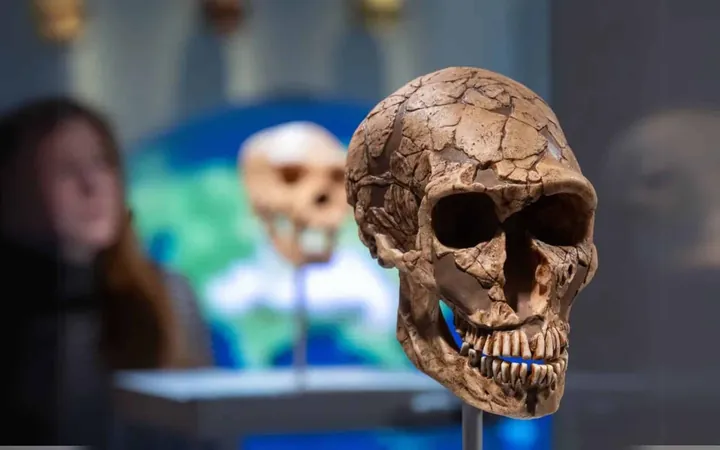
Shocking Archaeological Breakthrough: Interbreeding Between Two Ancestors Shatters Human Origins Theory!
2025-03-27
Author: Chun
A groundbreaking study from Cambridge University is disrupting the long-accepted narrative of human evolution, revealing that the story of how Homo sapiens came to be is much more intricate than previously believed.
The research, recently published in *Nature Genetics* and highlighted by several news outlets, including GBNews, challenges entrenched theories about our ancestral origins, providing new evidence that interbreeding between two distinct species was pivotal in shaping the genetic makeup of modern humans.
New Findings Challenge Long-Held Beliefs
For decades, it was widely accepted that modern humans emerged from a single ancestral population in Africa around 200,000 to 300,000 years ago. However, this new study indicates a much more complex saga, dating back to approximately 1.5 million years ago, when our ancestors branched off into two separate species.
Notably, these ancestral groups reunited and interbred roughly 1.2 million years later, laying down the genetic foundation for all contemporary human beings.
The intricate analysis of DNA conducted by the Cambridge team reveals that a staggering 80% of our genetic material can be traced back to one of these ancestral populations, which may have dwindled to just about 1,000 individuals before their reunion. This genetic bottleneck has significantly influenced the human genome as we recognize it today.
How Interbreeding Shaped Human Cognition
The second ancestral species, whose genetic imprint accounts for the remaining 20%, made a remarkable contribution particularly in genes associated with brain function.
Dr. Trevor Cousins, the study's lead author from Cambridge’s Department of Genetics, emphasized the significance of these findings, stating, "It's been long assumed we evolved from a single lineage, but our origins are decidedly murky."
The interbreeding that occurred contributed to crucial aspects of human brain development and cognitive processing, implying that these genetic exchanges were key to the rise of modern human intelligence.
Tracing Ancestral Lineages: The Potential Contributors
Evidence from fossil records suggests that two species, Homo erectus and Homo heidelbergensis, could be founding members of these ancestral lineages.
These species roamed across Africa and beyond, potentially forming the genetic groups highlighted in the new study.
While the interbreeding between Neanderthals, Denisovans, and Homo sapiens is well-documented around 50,000 years ago, this new research indicates that complex genetic mixing began much earlier, starting around 300,000 years ago — a critical moment that has been previously underestimated in its significance.
Revolutionizing the Study of Human Evolution
Dr. Richard Durbin, a co-author and researcher at Cambridge, stated, "Our research clearly illustrates that human evolution is not a simple process of isolated lineages but rather a mosaic of various groups that developed independently for over a million years before colliding to form modern humans."
This revelation challenges the conventional view of our evolutionary history and underscores the significant role of genetic exchange, not only among humans but across many species.
The study also highlights that while Neanderthal DNA makes up about 2% of the genome for non-African humans, the earlier interbreeding event is far more impactful on our genetic identity.
Innovative Methods Serve to Transform Evolutionary Studies
The Cambridge researchers utilized state-of-the-art computational algorithms, known as cobraa, which analyze how ancient human populations diverged and later merged.
In a departure from traditional approaches that rely on ancient DNA samples, this methodology primarily focuses on modern human DNA, employing data from comprehensive projects like the 1,000 Genomes Project and the Human Genome Diversity Project.
Co-author Dr. Aylwyn Scally remarked on the revolutionary nature of their findings: "The ability to reconstruct evolutionary events from contemporary genetic data is extraordinary. It reveals that our species' history is significantly richer and more intricate than we had previously imagined."
Looking ahead, the research team plans to improve their model to account for more gradual exchanges of genetic material, moving beyond just sudden splits and reunions.
They intend to align their groundbreaking discoveries with fossil evidence that suggests early human populations exhibited greater diversity than previously conceived.
This revelation not only reshapes our understanding of human ancestry but also opens exciting avenues for further research into the complexity of evolution across various species. Get ready to rethink everything you thought you knew about human origins!




 Brasil (PT)
Brasil (PT)
 Canada (EN)
Canada (EN)
 Chile (ES)
Chile (ES)
 Česko (CS)
Česko (CS)
 대한민국 (KO)
대한민국 (KO)
 España (ES)
España (ES)
 France (FR)
France (FR)
 Hong Kong (EN)
Hong Kong (EN)
 Italia (IT)
Italia (IT)
 日本 (JA)
日本 (JA)
 Magyarország (HU)
Magyarország (HU)
 Norge (NO)
Norge (NO)
 Polska (PL)
Polska (PL)
 Schweiz (DE)
Schweiz (DE)
 Singapore (EN)
Singapore (EN)
 Sverige (SV)
Sverige (SV)
 Suomi (FI)
Suomi (FI)
 Türkiye (TR)
Türkiye (TR)
 الإمارات العربية المتحدة (AR)
الإمارات العربية المتحدة (AR)